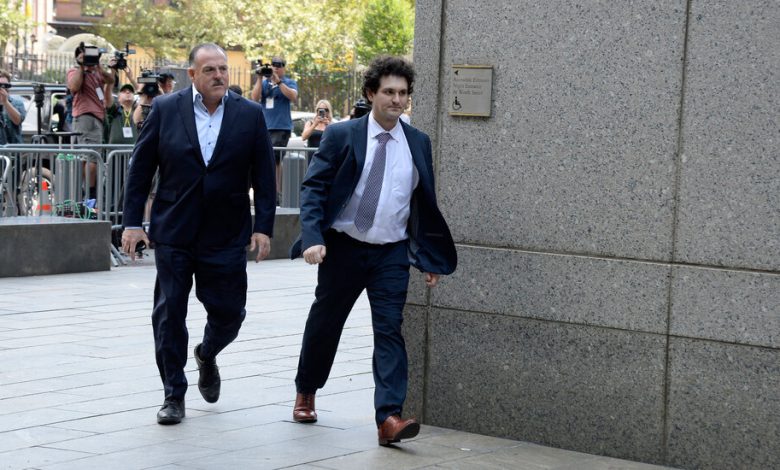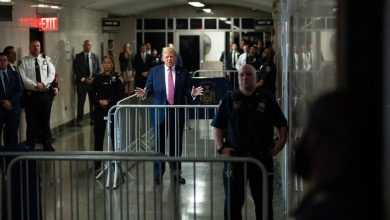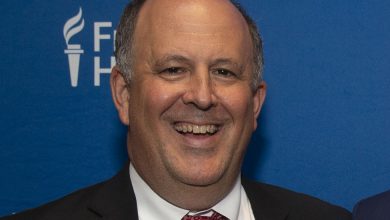Crypto’s Trial of the Century Is Set to Begin


Jury selection begins tomorrow in the highly anticipated fraud case involving Sam Bankman-Fried, right, the founder of crypto exchange FTX.Credit…Jefferson Siegel for The New York Times
Bankman-Fried’s day in court
The corporate world will cast its eyes on courts in New York and Washington this week, as a series of high-profile business cases are set to kick off.
In Manhattan, the fraud trial of Sam Bankman-Fried, the founder of the failed crypto exchange FTX, will begin with jury selection on Tuesday. Meanwhile, legal debates about the future of the Consumer Financial Protection Bureau and the power of regulatory agencies in court cases will dominate the Supreme Court’s new session starting on Monday (more on that below).
Why Bankman-Fried is on trial: Last November, FTX and Alameda Research, a sister hedge fund, imploded, stranding more than $8 billion in customer deposits and forcing the crypto exchange into bankruptcy. Their 31-year-old founder faces seven counts, including wire and securities fraud, as well as money laundering. He has pleaded not guilty. If convicted, he could receive what’s basically a life sentence.
The trial will cast a harsh glare on the wider crypto sector, whose culture of wild hype and speculation allowed FTX to flourish: “It wouldn’t have been possible in any other context,” Lee Reiners, a crypto expert at Duke Law School, told The Times.
But other crypto executives have been trying to distance themselves from Bankman-Fried, a former poster child for the sector, and hope he will be held accountable. “That will be cathartic for the crypto ecosystem,” Travis Kling of Ikigai Asset Management, which lost most of its assets from FTX’s collapse, told the Times.
Bankman-Fried faces a tough legal battle, experts say. Three of his closest associates have pleaded guilty and are cooperating with prosecutors, who have amassed millions of pages of evidence. That includes spreadsheets that the government says “kept track of illicit money flows.” As for Bankman-Fried, he was remanded to a Brooklyn jail in August after the judge in the case ruled that he had tried to interfere with witnesses.
The FTX founder’s defense appears focused in part on process. He has blamed accounting errors and mistakes by colleagues, while also suggesting that outside law firms authorized his actions. (His legal team has also argued that he has had trouble getting access to documents from jail, setting up grounds for a potential appeal.)
The trial is also getting an extra publicity boost from the author Michael Lewis. His book on Bankman-Fried, “Going Infinite,” comes out Tuesday. Lewis told “60 Minutes” that his subject was a fascinating character study: “He was a person who set out in life to maximize the consequences of his actions — never mind the intent,” Lewis said. “And he had exactly the opposite effects of the ones he set out to have. So it looks to me like his life is a cruel joke.”
Lewis also told “60 Minutes” that Bankman-Fried had actually weighed offering Donald Trump — a $5 billion figure was floated — not to run for president in 2024.
HERE’S WHAT’S HAPPENING
California’s governor names a successor to Dianne Feinstein. Gavin Newsom appointed Laphonza Butler, the head of the political fund-raising group Emily’s List and a former union leader, to replace the senator who died on Thursday. It’s unclear whether Butler will seek election to serve out a full term; three prominent California lawmakers have already announced they plan to run for Feinstein’s seat.
Hollywood actors resume talks with big studios on Monday. Attention is shifting to SAG-AFTRA, the last entertainment union on strike after the Writers Guild of America reached a deal last week; an agreement would end a monthslong work stoppage that has crippled Hollywood. Meanwhile, Governor Newsom rejected a bill backed by entertainment unions that would let their striking members collect unemployment checks.
The World Bank gets gloomy about Asia’s economy. The institution has forecast the lowest growth rate for eastern Asia in five decades. The World Bank says it expects China to grow just 4.4 percent next year, down from a prediction made in April of 4.8 percent; slowing consumer spending, a stagnant real estate market and declining private investment were among the factors it cited.
Tesla’s Cybertruck misses another deadline. The company’s long-awaited pickup model, which has drawn attention for its unconventionally angular design, had been expected to debut in the third quarter. More delays for the Cybertruck, which would be Tesla’s first new model in three years, initially set for release in 2021, could lead to consumers moving on to competitors’ offerings.
Supreme Court battlefields
The new Supreme Court term begins on Monday, and here are three big business cases that DealBook is keeping a close eye on.
The Consumer Financial Protection Bureau fights for its life. The court will begin hearing arguments on Tuesday in a case that could have profound implications for the future of the agency and the markets it regulates. Payday lenders sued the C.F.P.B. over a rule curbing fee withdrawals and won a sweeping victory in a federal appeals court last year. The ruling included a decision that the C.F.P.B. is unconstitutionally funded because it is financed directly by the Federal Reserve, which the judges said meant it wasn’t accountable to Congress.
Rohit Chopra, the C.F.P.B. director, has become a lightning rod. Consumer advocates hail him as a hero for aggressive actions against banks and other lenders. But critics and pro-business trade groups accuse his agency of a political agenda and say he “hates banks,” writes The Times’s Stacy Cowley. “Wall Street may always attack the C.F.P.B., but their opposition has reached, shall we say, frenzied levels with Rohit Chopra at the helm,” said Senator Sherrod Brown, the Ohio Democrat who leads the Senate Banking Committee.
Other regulators are also trying to safeguard their power. The court will hear a case pitting commercial fisheries against the Biden administration over a legal doctrine that allows agencies to interpret their own rules. The fisheries had challenged the federal fisheries service and lost under the so-called “Chevron deference,” which requires judges to defer to agencies. The fisheries want the court to overrule the principle, which could leave regulators of all stripes more vulnerable to legal attack.
Big tech platforms battle for free speech. The court agreed on Friday to take up two cases stemming from laws in Florida and Texas that prohibit social media companies from deleting posts based on the views expressed in them. The laws are backed by conservative commentators, who say the Big Tech platforms censor right-wing views. Trade groups challenged the laws, saying the government was prohibited from telling companies how private companies deal with free speech.
The next moves in shutdown chess
Corporate leaders and money managers are among those relieved that Speaker Kevin McCarthy helped pull off a bipartisan deal to avert a U.S. government shutdown, with just hours to spare.
But the drama is set to be replayed in six weeks — and it’s not clear that McCarthy will survive a mutiny by hard-right Republicans over his working with Democrats. Meanwhile, the economy still faces risks from a shutdown.
Conservative backlash against McCarthy was immediate. Representative Matt Gaetz of Florida, one of the speaker’s biggest critics, threatened to push for a vote to oust McCarthy this week. “I think we need to rip off the Band-Aid,” Gaetz told CNN.
McCarthy sounded defiant — “Bring it on,” he replied — but the risks to his leadership still loom large.
House Democrats could save him, if they want to. Gaetz’s putsch will need Democratic votes to succeed. Democrats are no fan of the speaker, especially after he allowed an impeachment hearing against President Biden to begin.
But with another shutdown deadline looming, would they want to help oust McCarthy or keep in power a speaker who’s shown some willingness to work with them? Politico’s Playbook lays out the game theory calculations that McCarthy and Gaetz now face.
Ackman would “absolutely” do a deal with Musk
Move over SPAC. The billionaire financier Bill Ackman sees a new kind of special purpose acquisition vehicle (or, SPAC) catching on with Wall Street, which since 2021 he has called a “SPARC”; the R stands for “Rights.”
Ackman already has some targets in mind for his SPARC, which has $1.5 billion to invest. They include Elon Musk’s X, a social media platform that Ackman has become quite active on in recent years.
As The Wall Street Journal reports:
The prospect of a Musk-Ackman deal is an extreme long shot. And Musk himself has said nothing — at least, not on X — about Ackman’s interest.
The markets’ winners and losers
Stock futures are rising this morning as the markets breathe a sigh of relief over the government having dodged a shutdown. But investors are still licking their wounds after a month — and a quarter — to forget.
The S&P 500 ended September in negative territory for a fourth consecutive year. The benchmark index was also down more than 3 percent for the quarter, as fears of soaring bond yields, rising oil prices and slowing growth triggered a widespread sell-off.
Oil was the big winner last quarter. The Brent crude benchmark jumped 27.2 percent and West Texas Intermediate 28.5 percent from the second quarter. That boom has also spurred a rally in Russian stocks: The Moscow Exchange rose 12.7 percent last quarter on a local currency basis (in dollar terms, it was up roughly 3 percent), and is now up more than 50 percent this year by the Russian measure.
THE SPEED READ
Deals
-
Venture capitalists are reportedly advising start-ups to consider delaying their I.P.O. plans after disappointment over the market debuts of Arm and Instacart. (FT)
-
The investment giant Carlyle is said to be in talks with Medtronic to buy two of its medical device businesses for about $7 billion. (Reuters)
Policy
-
Regulators in California are pushing back against PG&E’s $6 billion plan to run power lines underground to minimize wildfire risks. (WSJ)
-
“Why Can’t We Stop Unauthorized Immigration? Because It Works” (NYT)
Best of the rest
-
Robin Williams’s daughter, Zelda, criticized A.I. recreations of actors’ voices, including her father’s, as “at their worst, a horrendous Frankensteinian monster.” (Insider)
-
Anticipation of Taylor Swift attending Sunday’s matchup between the Kansas City Chiefs and the New York Jets — yes, she showed up — bolstered ticket prices for the N.F.L. game by more than 43 percent. (Variety, WaPo)
We’d like your feedback! Please email thoughts and suggestions to [email protected].




